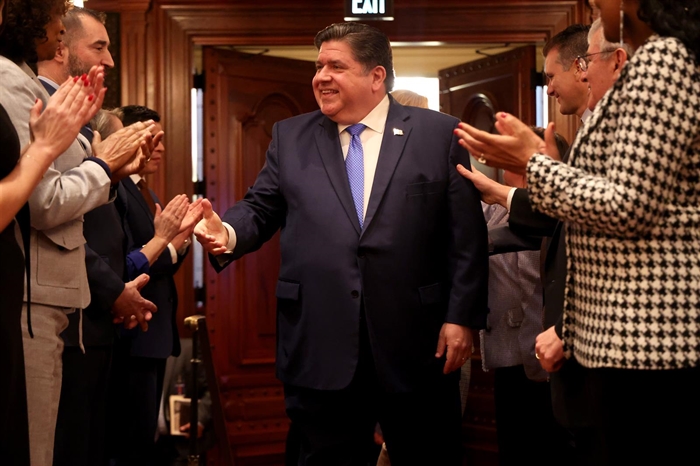Pritzker proposes $1.8B in spending growth, backed by tax increases for corporations, sportsbooks

SPRINGFIELD – Gov. JB Pritzker on Wednesday proposed growing state spending by about $1.8 billion in the upcoming fiscal year while making a handful of corporate, sports wagering and other tax changes to pay for the increase.
Pritzker’s plan, laid out to lawmakers during his annual budget address, does not alter or increase state income tax rates. But it would more than double the tax rate paid by sportsbooks on gross revenues and extend an existing cap on operating losses businesses can claim on taxes.
Those changes would account for about $726 million in revenues that were not captured in the state’s November estimates, in turn erasing much of what had been projected as an $891 million deficit for the upcoming fiscal year.
In total, Pritzker’s budget anticipates $52.9 billion in general revenue and $52.7 billion in spending for the state’s main discretionary spending account in the fiscal year that begins July 1.
“Now, I expect that some of you will want to spend more, and some of you will claim you want to spend less,” Pritzker said in his speech to lawmakers in the House chamber. “Know this: I am always open to good ideas that members of both parties have to more efficiently and effectively fulfill our obligations.”
The governor’s budgeting office is also projecting current-year revenues to grow by $199 million from previous estimates. The state expects the current fiscal year to end with $52.2 billion in total revenues, far outpacing the $50.4 billion in authorized spending in last year’s budget.
The budget proposes a $450 million increase in K-12 education, about $200 million less than what was requested by the Illinois State Board of Education. Higher education would increase by about 2 percent, or $30.6 billion, much less than the 5 percent increase the Illinois Board of Higher Education had requested.
It also allocates another $150 million for the second year of the governor’s “Smart Start Illinois” program for early childhood education, which is aimed at increasing the number of available preschool seats in the state by 20,000 over a four-year period.
Pritzker had previously noted Illinois will dedicate $182 million to address the influx of migrants from border states, particularly Texas. That sum was included in his proposal.
“I won’t pretend any of this is easy, but it would be irresponsible to do anything but come here, lay out the scope of the challenge, tell you what I think we need to do, and then work with you to make it happen,” Pritzker said of the state’s migrant response.
The governor’s office is proposing cutting $110 million in general revenue funding for a pair of health care programs for noncitizens that became a lightning rod last year amid quickly rising costs. With other funding sources including a $100 million federal match for emergency services, the total grows to $629 million, outpacing last year’s general revenue allocation.
The spending plan includes fully funding the state’s $10.1 billion required pension payment in the upcoming fiscal year. But the governor also proposed altering the state’s so-called “pension ramp” in a way his administration hopes will be viewed positively by credit ratings agencies.
The proposal includes increasing the target funding percentage for pension funds to 100 percent, up from 90 percent, while adding another three years for the ramp to reach that point. The fully funded goal would be moved to fiscal year 2048, from FY 45.
Other revenue changes include raising $101 million by capping a sales tax credit retailers are allowed to claim and $175 million by transferring some payments to public transit agencies from general funds to the road fund.
The governor also proposed permanently eliminating the state’s 1 percent grocery tax.
State Sen. Jil Tracy (R-Quincy) said Pritzker is asking Illinoisans for an extra $1.1 billion in taxes in the coming year to help pay for a fiscal crisis of his own making – supporting thousands of noncitizens he invited to Illinois.
“In his State of the State/Budget Address, Gov. Pritzker has made it clear that Illinoisans are not his priority – they are a source of tax dollars he wants to use again and again to pay for a fiscal crisis of his own making,” Tracy said. “He has proposed a $53 billion budget – the biggest in state history – and needs to raise your taxes by another $1.1 billion to pay for it. Those revenues are needed to pay for the thousands of noncitizens that have come to Illinois at the invitation of the Governor.”
Tracy says such record-high spending puts Illinois’ fiscal future in jeopardy.
“In the last couple years, this kind of over-the-top spending was only possible with the help of billions of federal tax dollars. But that fiscal picture has changed,” Tracy said. “Federal pandemic aid has ended, an economic slowdown is looming, and Democratic leaders continue their spending spree with the largest spending plan in Illinois history. By any financial measurement, such out-of-control spending is not sustainable.”
As the legislative budget process gets under way, Tracy says she stands ready to work with lawmakers on both sides of the aisle to make the tough decisions necessary to pass a balanced budget with structural reforms that will boost the economy and jobs.
Capitol News Illinois is a nonprofit, nonpartisan news service covering state government. It is distributed to hundreds of newspapers, radio and TV stations statewide. It is funded primarily by the Illinois Press Foundation and the Robert R. McCormick Foundation, along with major contributions from the Illinois Broadcasters Foundation and Southern Illinois Editorial Association.
Miss Clipping Out Stories to Save for Later?
Click the Purchase Story button below to order a print of this story. We will print it for you on matte photo paper to keep forever.

